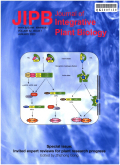- 钛学术文献服务平台 \
- 学术期刊 \
- 基础科学期刊 \
- 生物科学期刊 \
- 植物学报(英文版)期刊 \
Hydrogen sulfide, a signaling molecule in plant stress responsesFA
Hydrogen sulfide, a signaling molecule in plant stress responsesFA
基本信息来源于合作网站,原文需代理用户跳转至来源网站获取
摘要:
Gaseous molecules, such as hydrogen sulfide (H2S) and nitric oxide (NO), are crucial players in cellular and (patho)physiological processes in biological systems. The biological functions of these gaseous molecules, which were first discovered and identified as gasotransmitters in animals, have received un-precedented attention from plant scientists in recent decades. Researchers have arrived at the consensus that H2S is synthesized endogenously and serves as a signaling molecule throughout the plant life cycle. However, the mechanisms of H2S action in redox biology is still largely unexplored. This review high-lights what we currently know about the character-istics and biosynthesis of H2S in plants. Additionally, we summarize the role of H2S in plant resistance to abiotic stress. Moreover, we propose and discuss possible redox-dependent mechanisms by which H2S regulates plant physiology.

推荐文章
Stress-XP重音理论与汉语三大特殊句式分析
句子重音
Stress-XP理论
汉语特殊句式
最大投射
The hydrogen and oxygen isotopic compositions of hydroxyl in clay mineral from a weathering profile:
Weathering profile
Hydrogen and oxygen isotopes
Hydroxyl
Kaolinite
基于Plant Simulation的离散制造系统仿真研究
离散制造系统
建模仿真
系统仿真
仿真模型
Soil organic carbon dynamics study bias deduced from isotopic fractionation in corn plant
Bias of SOC dynamics study
Isotopic fractionation in corn
Isotope mass balance equation
Bias range
内容分析
关键词云
关键词热度
相关文献总数
(/次)
(/年)
引文网络
引文网络
二级参考文献 (718)
共引文献 (118)
参考文献 (104)
节点文献
引证文献 (0)
同被引文献 (0)
二级引证文献 (0)
1964(1)
- 参考文献(0)
- 二级参考文献(1)
1969(1)
- 参考文献(0)
- 二级参考文献(1)
1971(1)
- 参考文献(0)
- 二级参考文献(1)
1972(1)
- 参考文献(0)
- 二级参考文献(1)
1973(2)
- 参考文献(0)
- 二级参考文献(2)
1976(4)
- 参考文献(0)
- 二级参考文献(4)
1978(3)
- 参考文献(1)
- 二级参考文献(2)
1980(3)
- 参考文献(1)
- 二级参考文献(2)
1981(2)
- 参考文献(0)
- 二级参考文献(2)
1982(7)
- 参考文献(1)
- 二级参考文献(6)
1983(3)
- 参考文献(0)
- 二级参考文献(3)
1984(2)
- 参考文献(0)
- 二级参考文献(2)
1985(4)
- 参考文献(1)
- 二级参考文献(3)
1987(2)
- 参考文献(0)
- 二级参考文献(2)
1988(3)
- 参考文献(0)
- 二级参考文献(3)
1989(1)
- 参考文献(0)
- 二级参考文献(1)
1990(3)
- 参考文献(0)
- 二级参考文献(3)
1991(3)
- 参考文献(0)
- 二级参考文献(3)
1992(5)
- 参考文献(2)
- 二级参考文献(3)
1994(3)
- 参考文献(0)
- 二级参考文献(3)
1995(1)
- 参考文献(0)
- 二级参考文献(1)
1996(4)
- 参考文献(1)
- 二级参考文献(3)
1997(15)
- 参考文献(0)
- 二级参考文献(15)
1998(8)
- 参考文献(1)
- 二级参考文献(7)
1999(8)
- 参考文献(1)
- 二级参考文献(7)
2000(14)
- 参考文献(3)
- 二级参考文献(11)
2001(25)
- 参考文献(0)
- 二级参考文献(25)
2002(26)
- 参考文献(0)
- 二级参考文献(26)
2003(7)
- 参考文献(0)
- 二级参考文献(7)
2004(29)
- 参考文献(0)
- 二级参考文献(29)
2005(30)
- 参考文献(6)
- 二级参考文献(24)
2006(40)
- 参考文献(2)
- 二级参考文献(38)
2007(26)
- 参考文献(1)
- 二级参考文献(25)
2008(36)
- 参考文献(6)
- 二级参考文献(30)
2009(46)
- 参考文献(1)
- 二级参考文献(45)
2010(65)
- 参考文献(4)
- 二级参考文献(61)
2011(46)
- 参考文献(3)
- 二级参考文献(43)
2012(39)
- 参考文献(4)
- 二级参考文献(35)
2013(69)
- 参考文献(14)
- 二级参考文献(55)
2014(63)
- 参考文献(9)
- 二级参考文献(54)
2015(58)
- 参考文献(9)
- 二级参考文献(49)
2016(42)
- 参考文献(6)
- 二级参考文献(36)
2017(28)
- 参考文献(5)
- 二级参考文献(23)
2018(27)
- 参考文献(9)
- 二级参考文献(18)
2019(9)
- 参考文献(6)
- 二级参考文献(3)
2020(7)
- 参考文献(7)
- 二级参考文献(0)
2021(0)
- 参考文献(0)
- 二级参考文献(0)
- 引证文献(0)
- 二级引证文献(0)
引文网络交叉学科
相关学者/机构
期刊影响力
植物学报(英文版)
主办单位:
中国植物学会
出版周期:
月刊
ISSN:
1672-9072
CN:
11-5067/Q
开本:
大16开
出版地:
北京香山南辛村20号中科院植物所内
邮发代号:
2-500
创刊时间:
1952
语种:
eng
出版文献量(篇)
3621
总下载数(次)
1
总被引数(次)
74646
期刊文献
相关文献
推荐文献
- 期刊分类
- 期刊(年)
- 期刊(期)
- 期刊推荐
力学
化学
地球物理学
地质学
基础科学综合
大学学报
天文学
天文学、地球科学
数学
气象学
海洋学
物理学
生物学
生物科学
自然地理学和测绘学
自然科学总论
自然科学理论与方法
资源科学
非线性科学与系统科学
植物学报(英文版)2022
植物学报(英文版)2021
植物学报(英文版)2020
植物学报(英文版)2019
植物学报(英文版)2018
植物学报(英文版)2017
植物学报(英文版)2016
植物学报(英文版)2015
植物学报(英文版)2014
植物学报(英文版)2013
植物学报(英文版)2012
植物学报(英文版)2011
植物学报(英文版)2010
植物学报(英文版)2009
植物学报(英文版)2008
植物学报(英文版)2007
植物学报(英文版)2006
植物学报(英文版)2005
植物学报(英文版)2004
植物学报(英文版)2003
植物学报(英文版)2002
植物学报(英文版)2001
植物学报(英文版)2000
植物学报(英文版)1999
植物学报(英文版)1998
植物学报(英文版)2021年第9期
植物学报(英文版)2021年第8期
植物学报(英文版)2021年第7期
植物学报(英文版)2021年第6期
植物学报(英文版)2021年第5期
植物学报(英文版)2021年第4期
植物学报(英文版)2021年第3期
植物学报(英文版)2021年第2期
植物学报(英文版)2021年第11期
植物学报(英文版)2021年第10期
植物学报(英文版)2021年第1期

 免费查重
免费查重










